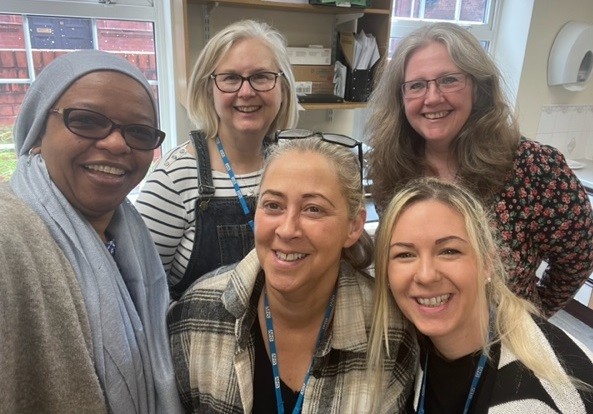Published on: 11th July 2023
 Peer support worker Zainab Nasko, 50 from Tameside, trained as a microbiologist and worked in pathology lab for 10 years before she became mental health wellbeing coach and peer support worker. Her own experiences of mental health and trying to manage it made her want to support others, just as she had been by her friend:
Peer support worker Zainab Nasko, 50 from Tameside, trained as a microbiologist and worked in pathology lab for 10 years before she became mental health wellbeing coach and peer support worker. Her own experiences of mental health and trying to manage it made her want to support others, just as she had been by her friend:
“I was so down I felt like I was drowning, but someone special supported me to stay afloat. She was a nursery nurse who’d experienced something similar to what I was going through, she took time to share her experiences and helped me see the light at the end of the tunnel. She was kind and empathetic and so generous with her time even though she was a very busy working mum. She was my role model. I wanted to help others the way she had helped me.
“I started volunteering at a mental health charity and that’s taken me to where I am now, a paid peer support worker in our Structured Clinical Management Pathway Team based in Oldham.
“Being a peer support worker has helped me build confidence and resilience and gain a better understanding of myself and others. It’s given me the opportunity to share with others what has worked for me and develop coping mechanisms that will hopefully help them see the light at the end of the tunnel. Peer support is reciprocal in nature, you learn from people as you support them my own mental health has benefitted too.
“Sharing with others who have the same experiences as you is so powerful, a lot of the time it’s hearing the experiences of others that gives you courage to forge on. It validates your experiences and motivates you to achieve your recovery goals.
“Having peer support mentors gives patients access to a community support system, which provides them with an alternative to A&E and hospital admissions. It’s promoting person-centered practice and gives patients the opportunity to have a say in the way they are managed, creating better outcomes and experiences.”
Gillian Roberts, manager of Oldham’s Structured Clinical Management Pathway Team, spoke of how valuable the peer support role has been to both her colleagues and those they support:
“Zainab’s role promotes community access, a friendly listening ear and enables patients to enjoy fun new experience. With this they can escape a world controlled by negative thoughts and fears, as mental health practitioners it's fantastic to see this happen.
“Having someone with similar lived experience brings an extra layer of trust which reduces barriers and improves the engagement of patients with the intervention we offer."
Dr Amanda Diver, consultant clinical psychologist, added:
“The links the role builds with other people and available activities in the community are invaluable, it helps people ‘live well in the community’ long term and be safely discharged from services. The process becomes much less traumatic and more successful.
“The human qualities of Zainab and peer support workers are a constant reminder of humanity and the patient’s perspective when we get too caught up in professional and ethical considerations. It’s granted us permission for the human part of ourselves to be more visible and acceptable.”